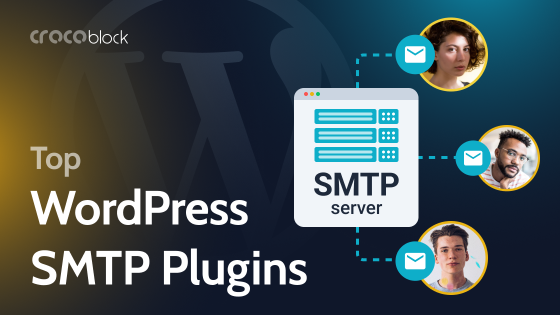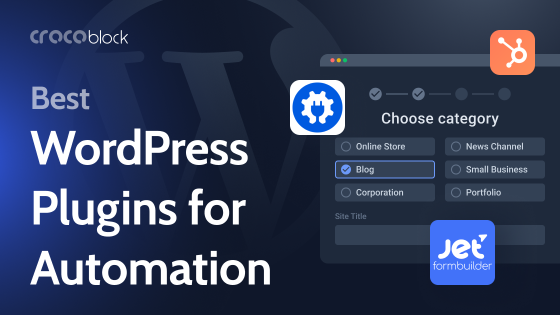Whether you have an eCommerce site, a personal blog, a professional portfolio, or a nonprofit organization’s website, having a contact form is essential. It allows visitors to contact you, inquire about your products or services, provide feedback, or collaborate with you.
As a WordPress user, you may have noticed the absence of a default option to create contact forms. This is where plugins come to the rescue, bridging the gap and offering a solution for creating different form types.
This article explores the best WordPress contact form plugins and examines their features, usability, and compatibility. I hope it can help you make an informed choice for your specific needs.
Table of Contents
How I Tested WordPress Form Plugins
To verify the top contact form plugins, I tested them using a dedicated WordPress site. I focused on plugins offering free versions or trials to assess their functionality. I also explored plugins that provided a functional free online demo. Finally, I considered user reviews and plugin developers’ credibility.
During the testing phase, I paid attention to the following aspects.
Firstly, I assessed the plugins’ ease of use and learning curve. Essentially, user-friendly form builders must employ intuitive interfaces and drag-and-drop editors. I also evaluated the time required for creating and styling forms, considering the efficiency of the plugin’s design tools. For many web developers reducing hours for tasks that can be automated is a priority.
Furthermore, I extensively tested the functionalities of the plugins. I examined their basic features, such as building forms with fields like text, number, email, radio buttons, and drop-downs. Then, I checked whether the plugins offered advanced capabilities. This includes conditional logic, post-submit actions, submitted data analytics, spam protection, and more.
Finally, I examined the compatibility of the plugins with the essential tools I use on my website. This encompassed assessing their integration with other plugins and themes. It is recommended to review the plugin’s documentation and check for compatibility notes. Often, if there are any compatibility issues, the users mention them in reviews.
By evaluating these factors, I selected the best WordPress contact form plugins. In fact, I recommend using this testing algorithm before deciding on any new plugins.
Top WordPress Contact Form Plugins
WPForms (Free/Premium)
🏆 Best for building simple contact forms without knowing the code.
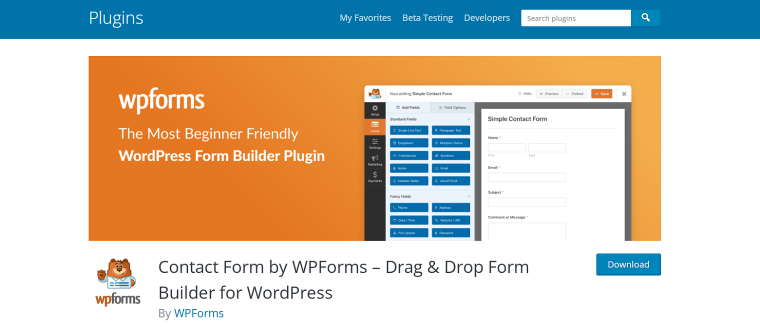
WPForms is an easy and powerful drag-and-drop WordPress form builder. It’s very popular among users, with 5+ million downloads from the WordPress.org platform.
The plugin prioritizes a straightforward user interface with pre-built templates making it perfect for inexperienced WordPress users. All forms made with WPForms are mobile-responsive and optimized for SEO.
Main features:
- drag-and-drop editor;
- 150+ form templates;
- reCAPTCHA feature;
- includes Stripe Payment Form;
- allows customizing forms using HTML blocks and custom CSS;
- integration with Elementor, Divi, and Gutenberg.
Pricing: a free version with limited capabilities is available. The paid plans range from $99 to $599, each offering a different number of advanced features.
Pros:
- great to build forms using templates;
- easy to use, even for beginners.
Cons:
- the free version is suitable for simple contact forms only.
JetFormBuilder (Free/Pro)
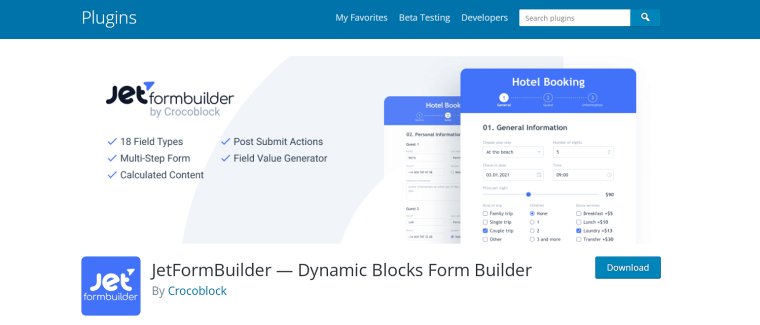
JetFormBuilder is one of Crocoblock’s plugins known as JetPlugins. Its drag-and-drop editor is based on the WordPress native editor. So it is easy for most users to learn and use. A notable aspect of this plugin is that all its features are free. It offers fields with conditional logic and calculated content, supports the creation of multi-step forms, and allows preset field values.
Unlike competitors, JetFormBuilder enables fine-tuning each form detail individually to achieve unique designs. Additionally, it provides various options for post-submit actions. They can also be customized using conditional logic.
Users can further extend JetFormBuilder’s dynamic characteristics by integrating it with JetEngine. This will allow you to automatically populate forms with dynamic content, save submitted data to custom post types, and open many other capabilities.
📚 Read also: Common JetFormBuilder Mistakes and Avoiding Them
Main features:
- 24 field types, including hidden, range, calculated, and repeater fields;
- 14 post-submit actions, including Insert/Update Post, User Registration, WooCommerce Cart & Checkout;
- conditional logic for hiding fields and for triggering specified post-submit actions;
- integration with free JetStyleManager for unlimited styling options;
- support of dynamic and pre-filled values;
- storing and managing submitted data in the admin dashboard;
- free integration with PayPal and marketing services;
- a visual drag-and-drop editor.
Pricing: the basic plugin is free. You can buy paid add-ons for different third-party integrations for $39 each or $79 in a bundle.
Pros:
- advanced customization and styling options;
- more free advanced features and third-party integrations than any other plugins.
Cons:
- has fewer pre-built templates than some other premium plugins.
Gravity Forms (Premium)
🏆 Best for building sophisticated form-related solutions.
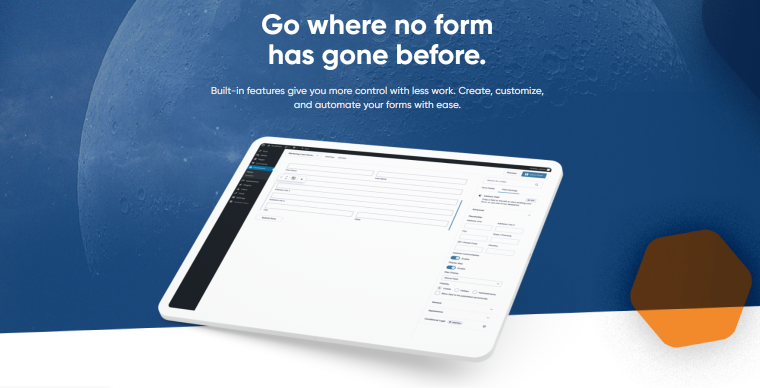
Gravity Forms is a paid WordPress form plugin that has many advanced features. With the help of additional add-ons, it can build various complex forms, including WordPress contact forms. The plugin has robust conditional logic features. For example, a notification can be sent to a user once they submit a form, requesting them to perform a specific action.
Main features:
- 30+ form fields;
- clean interface;
- ability to build multi-step and multi-column forms;
- users can save their form entries and continue completion at any time;
- dynamic field population;
- file uploads.
Pricing: Gravity Forms Basic license costs $59 per year, Pro license costs $159 per year and is good for three sites, and Elite license for unlimited sites costs $259 p/y.
Pros:
- robust conditional logic;
- preserves data to Google Sheets;
- provides a 14-day demo with the most advanced features and a 30-day money-back policy.
Cons:
- no free version is available;
- you’d need more paid third-party tools for automated integration and analysis of submitted data.
Paperform (Premium)
🏆Best for users who like to build forms with text-based editor.

Paperform is a flexible online platform that helps small businesses and teams simplify work and get more done. It takes payments, manages bookings, collects information, or runs an entire company – building the solutions you need tailoring to your unique brand.
Main features:
- a text-based editor that resembles Google Docs;
- over 80 various payment integrations, including Stripe, PayPal Business, Square, and Braintree;
- 650+ pre-built form templates;
- ability to customize colors, fonts, layouts, and themes;
- calculated fields and conditional logic;
- synchronization with Google Sheets for automated workflows.
Pricing: Paperform offers three paid plans starting at $240 per year.
Pros:
- versatile tools for collecting data and analyzing it;
- connects with over 2000 popular apps to increase website productivity.
Cons:
- no free version is available.
Jetpack Forms (Free)
🏆 Best for small websites looking for an all-in-one solution.
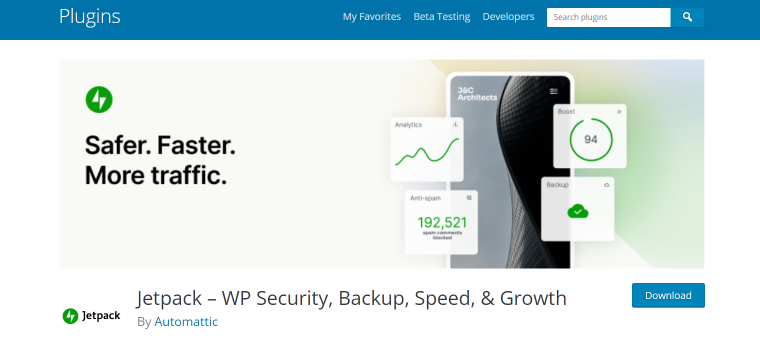
Jetpack Forms is a part of the free Jetpack plugin created by Automattic, the company behind the WordPress.com platform. And the founder of Automattic is also a co-founder of the WordPress open-source content management system.
Overall, Jetpack Forms offers basic functionality for building contact forms, such as spam protection and email notifications. If you already have Jetpack suite installed on your WordPress site, this WordPress contact forms plugin will satisfy your basic form-building requirements.
Main features:
- adds a one-click button to add contact forms to every page and post;
- integrates with the Akismet plugin for spam protection;
- allows email notifications;
- provides pre-built templates;
- integrates with the WordPress block editor.
Pricing: free.
Pros:
- provides tools for building basic contact forms together with security and optimization features.
Cons:
- has fewer customization features than other form builders;
- comes with non-form-related features that may add bloat to your site.
MetForm (Free/Premium)
🏆 Best for customizing contact forms with an Elementor builder.
MetForm is the most flexible and user-friendly form builder plugin for Elementor. It adds 40 new widgets to design contact forms, multi-step forms, newsletter signups, event forms, registration forms, booking forms, and more.
Main features:
- saves submitted data in the admin panel;
- supports shortcodes;
- 30+ pre-built templates;
- allows creating groups of fields and adding them to forms in one click;
- CRM integrations – Hubspot Contact & Forms, Zoho Contact, and HelpScout;
- allows limiting the number of submissions;
- includes GDPR compliance features.
Pricing: the free version is available, and paid plugin costs $39 per year for one site.
Pros:
- easy-to-use Elementor-based editor with 39 field types.
Cons:
- does not work with builders other than Elementor.
Quform (Premium)
🏆 Best for easy theming of WordPress contact forms.
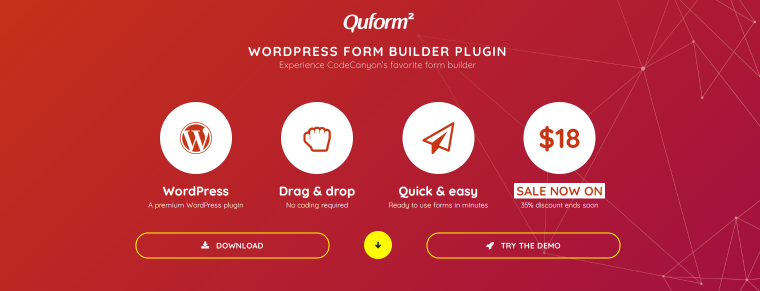
Quform is a WordPress form plugin with a powerful and customizable form builder. Its main benefit is the ability to create and stylize forms very quickly. Users can rearrange fields with drag-and-drop action, copy fields and styles, and apply pre-defined themes to forms in one click.
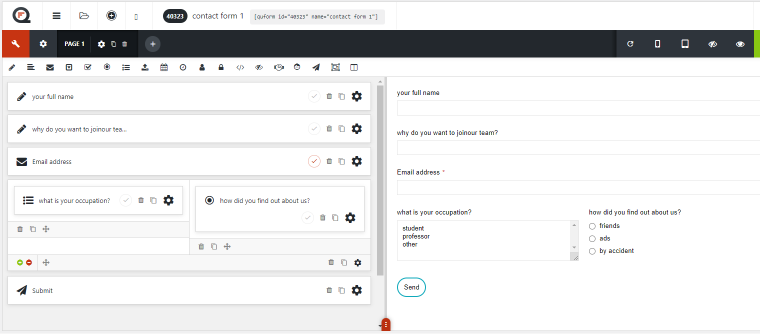
The Quform forms editor divides the screen into two sections. As you change the form on the left, you can preview it live on the right. You can also change the size of the preview section to see how the form will look on different screen sizes.
Main features:
- straightforward user interface;
- 19 element types to use in the drag-and-drop editor;
- autocomplete and default values;
- conditional logic to show/hide fields and to choose recipients for email notifications;
- filters to strip unwanted inserted data;
- 11 themes included.
Pricing: Quform one-time license costs $29 with 6-month support.
Pros:
- modern easy-to-use form builder;
- versatile tools to apply pre-designed and custom themes.
Cons:
- doesn’t allow customizing each form element separately;
- limited post-submit actions.
FormCraft (Premium)
🏆 Best for using customizable templates and designs to match your brand style.

This premium WordPress plugin offers many pre-built form templates with beautiful designs. They serve as a starting point and can be customized to align with the brand’s aesthetics. You can modify colors, fonts, and backgrounds and apply custom CSS to create forms. They will not only capture information but also reflect your unique identity.
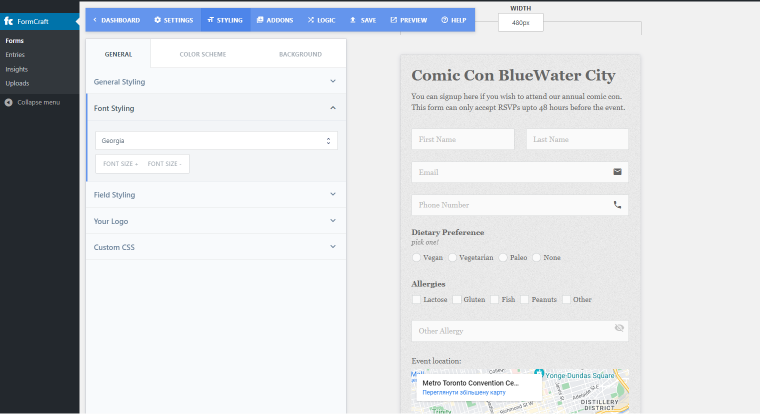
Additionally, FormCraft provides built-in analytics and advanced reporting features. They allow you to track form conversion rates and analyze user behavior to optimize your forms.
Main features:
- pre-designed ready-to-use forms;
- includes Mailchimp and Mailpoet add-ons;
- integrates with PayPal and Stripe;
- allows building calculated fields using simple math expressions;
- fields with conditional logic;
- save form progress.
Pricing: a FormCraft license with 6-month support is available at CodeCanyon for $30.
Pros:
- easy to customize pre-built designs;
- inbuilt analytics tools.
Cons:
- some add-ons require additional payments.
Formidable Forms (Free/Premium)
🏆 Best for advanced users looking for a premium contact forms plugin.
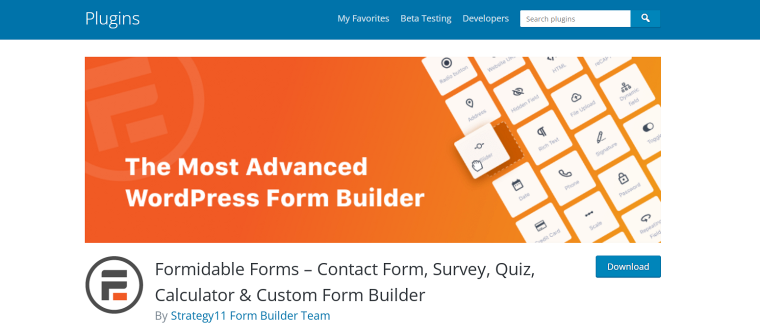
Formidable Forms is known for its flexibility, robust feature set, and ease of use. The free version includes seven field types to create basic contact forms. But the real value of this WordPress contact form plugin is in its premium version. With advanced field types, integration options, automation features, and enhanced styling, Formidable Forms are ideal for making interactive and dynamic forms.
Main features:
- drag-and-drop builder;
- ability to display form data on the front end;
- advanced field types, including the repeater and calculated fields;
- form templates library;
- white label form builder;
- upload files;
- front-end submissions.
Pricing: a free version is available. Premium versions start at $79 per year.
Pros:
- advanced form-building features;
- ability to display, filter and search submitted data.
Cons:
- the pro version may not be suitable for beginners.
Ninja Forms (Free/Premium)
🏆 Best for beginner users who want to build advanced WordPress contact forms.
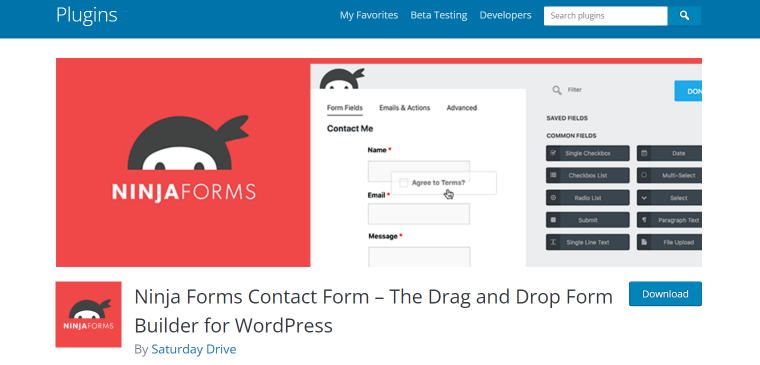
Ninja Forms WordPress plugin is one of the most known contact form plugins, with nearly 1 million active installations on WordPress.com and 30+ million downloads. Despite having lots of advanced options in the Pro version, the plugin’s user-friendly interface allows adding form fields, customizing their settings, and arranging them effortlessly.
Main features:
- 27+ form field types;
- ability to save submitted data as PDFs, Excel files, and Google Sheets;
- integrations with marketing and payment services;
- spam protection;
- webhooks;
- helps with WordPress GDPR compliance.
Pricing: a free version is available. Four paid plans range from $99 to $599 per year, each offering more paid add-ons.
Pros:
- a beginner-friendly plugin with advanced features.
Cons:
- to use all premium features and add-ons, you’d have to buy a very expensive license.
Contact Form 7 (Free)
🏆 Best for users who need a lightweight and straightforward solution.
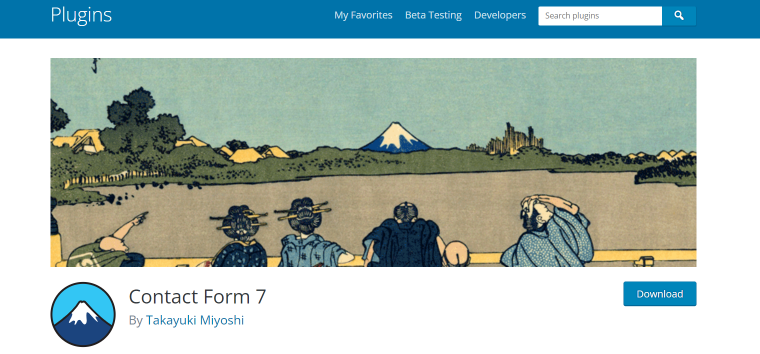
Contact Form 7 is the WordPress contact form plugin with the most active installation on WordPress.org, which is 5+ million. It is also one of the oldest form plugins.
The plugin doesn’t offer some of the advanced features that premium plugins do, and it doesn’t have the cleanest user interface. But it’s free. And using it shouldn’t be a problem for anyone used to creating WordPress posts and pages.
Also, if you look through negative comments (which are in the minority) by users, you’ll notice complaints about incompatibility issues with other plugins. For this reason, test Contact Form 7 before deciding to use it for all your forms.
Main features:
- spam protection with reCAPTCHA and Akismet;
- various field types, including drop-down menus and file uploads;
- AJAX form submitting.
Pricing: free.
Pros:
- one of the best free WordPress contact forms plugins.
Cons:
- it feels outdated compared to newer form-building plugins.
Everest Forms (Free/Premium)
🏆 Best for users who like intuitive UI.
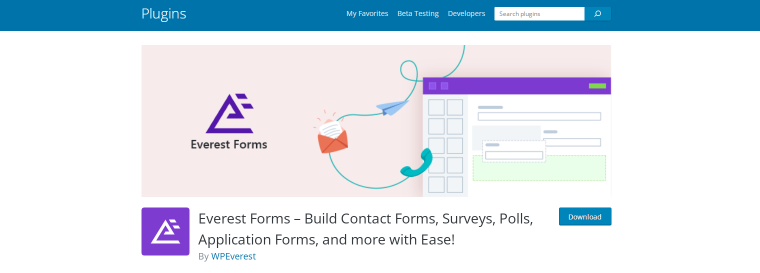
This plugin has a nearly perfect average rating at WordPress.org, with 300 out of 317 reviews giving it five stars. Most users acknowledge that the plugin has a user-friendly interface and more advanced functionalities compared to most free solutions.
Main features:
- drag-and-drop builder with live preview;
- instant email notifications;
- multi-step forms;
- form templates;
- form submission without reloading the page.
Pricing: a free version is available at WordPress.org, and a paid plan with advanced features costs $69 per year for one site.
Pros:
- many advanced features in the free version;
- user-friendly interface.
Cons:
- the premium version misses some features that other premium plugins have.
Forminator (Free)
🏆 Best for constructing contact forms in the block editor.
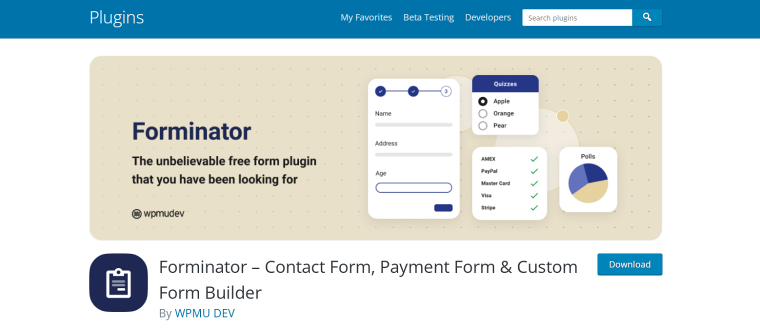
Forminator is a WordPress form plugin developed by WPMU DEV, a well-known company specializing in creating premium WordPress plugins and themes. While this product is absolutely free, it offers a range of customization options and features that make it very popular. Forminator has over 400 thousand active downloads on WordPress.org and a 4.8-star average rating.
Main features:
- drag-and-drop blocks editor;
- calculated fields;
- several post-submit types of actions, including redirecting to the page;
- live stats using pie charts and graphs;
- front-end post submissions;
- integrations with Stripe and PayPal.
Pricing: free.
Pros:
- clean and intuitive user interface;
- includes many advanced features.
Cons:
- lacks some premium features, like conditional fields and a template library.
HappyForms (Free/Premium)
🏆 Best for simple creation and styling of WordPress contact forms.
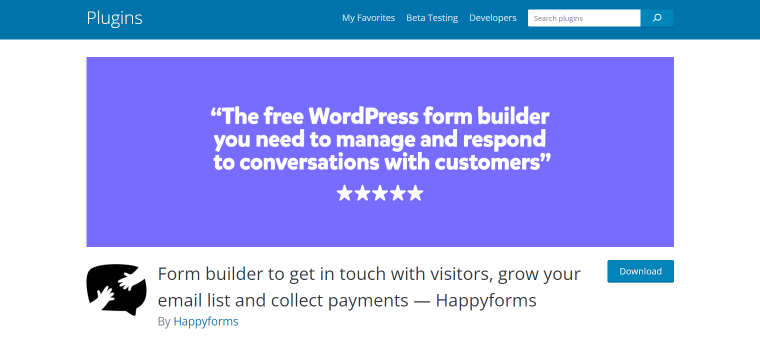
HappyForms is developed by the Theme Foundry. This company creates high-quality WordPress themes and plugins focusing on user experience.
HappyForms is among the top form plugins for WordPress because it’s very lightweight in terms of performance and is beginner friendly. The form creation process is straightforward thanks to a real-time live preview feature, and styling contact forms can be done with one click. This makes HappyForms a go-to solution for specialists who focus on reducing the number of development hours.
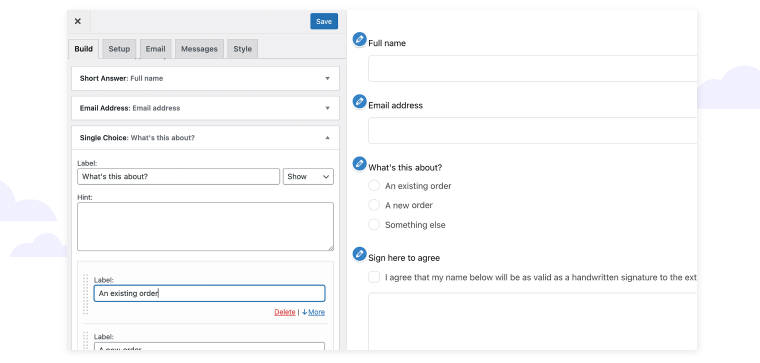
Main features:
- 20+ fields, including signature and slider fields;
- Gutenberg-ready;
- allows seeing the referrer’s IP address;
- in-built HoneyPot and Google reCAPTCHA for spam protection;
- import/export forms to duplicate them on other sites.
Pricing: the free version includes limited features; the cheapest premium plan is $79 per year for one website.
Pros:
- user-friendly interface with live preview;
- straightforward customization settings.
Cons:
- the free version lacks many essential features, like multi-step forms and conditional logic.
Fluent Forms (Free/Premium)
🏆 Best for users who want a form builder with the most customization options.
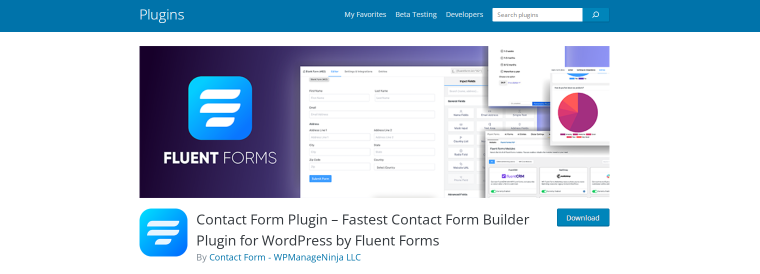
Fluent Forms is a WordPress forms builder developed by WPManageNinja, the company behind the Ninja Tables plugin.
The plugin has an impressive 4.8 rating on WordPress.org and over 300,000 active installations. The Pro version of the plugin provides an extensive range of features. Notably, it boasts 48 elements within its form builder, including 36 field types.
Main features:
- drag-and-drop contact form builder;
- 36 input fields;
- 66 pre-built form templates;
- ability to transfer submitted data directly into WordPress posts and pages;
- forms scheduling.
Pricing: a free version is available; a single-site Pro license costs $59 annually.
Pros:
- many customization features;
- the free version includes advanced features like conditional logic and some pre-built templates.
Cons:
- limited design options.
FAQ
Yes, many WordPress contact form plugins offer free versions. Most provide essential form-building functionalities (WPForms, Jetpack Forms, HappyForms), while some offer advanced features for creating complex forms (JetFormBuilder).
Typically, WordPress form plugins have in-built spam protection features, such as reCAPTCHA integration. Website owners need to prevent unwanted submissions.
The essential features may vary based on your specific needs. But some basic features include a user-friendly interface, a wide range of field types, spam protection, conditional logic, submitted data analytics, and options for post-submit actions.
Before deciding on a WordPress plugin, download its free version on your website or sign up for a free trial. Evaluate its ease of use and functionality and ensure it meets your needs. Check whether it is compatible with your other essential WordPress tools. Review user feedback and ratings.
Summary
Using a high-quality form plugin can bring numerous benefits to your website. With the many available options, choosing the right solution is not easy. In this article, I have discussed the benefits of using the top 15 WordPress contact form plugins. Here are the plugins with the most distinctive features:
- WPForms provides a user-friendly form builder for simple contact forms.
- JetFormBuilder has the most powerful capabilities to make your forms dynamic and interactive.
- Jetpack Forms suits small businesses that need to build simple contact forms.
- Quform is an excellent solution to assign your forms a theme with one click.
- Ninja Forms successfully combines advanced customization features with straightforward UI.
- Everest Forms is one of the best free plugins with more than basic form-building functionalities.
- HappyForms helps reduce developing hours by simplifying form creation so developers can focus on other things.
- Fluent Forms has more different field types than other plugins. You just have to learn what’s the function of each of them.
And to learn about WordPress form plugins that work well with Elementor, read one of our previous blogs.

